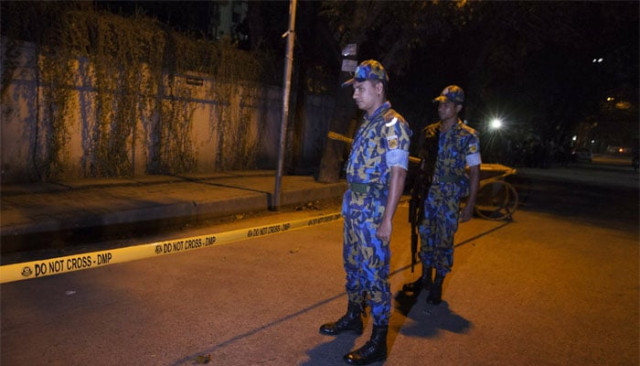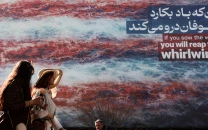Bangladesh opposition says foreigner killings sign of deeper crisis
Bangladesh Nationalist Party has staged protests since Hasina's party won second consecutive term in January 2014

Bangladeshi police officers stand guard on September 28, 2015 at the site where an Italian charity worker has died after being shot by attackers in Dhaka. PHOTO: AFP
The opposition Bangladesh Nationalist Party (BNP) has staged violent protests since Prime Minister Sheikh Hasina's Awami League won a second consecutive term in January 2014. The BNP boycotted the election, which was deemed by international observers to be flawed.
At the same time, Islamist groups have been staging high-profile attacks in the impoverished South Asian nation. Earlier this year, four online critics of religious militancy were hacked to death. Over the past week, the Islamic State has claimed responsibility for shooting an Italian and a Japanese man and threatened more such attacks.
“Such downward trends will continue until there is some kind of political reconciliation between the two major political parties in Bangladesh,” Abdul Moyeen Khan, a senior BNP leader, told Reuters in an interview on Friday.
Moyeen, a former federal minister, said there had been attempts by the international community, including the United Nations, to broker peace between the parties. But months of behind-the-scenes efforts had failed to yield results and the Awami League had refused to engage in negotiations.
Mahbubul Alam Hanif, acting secretary general of the Awami League, blamed the opposition for the political violence and ruled out negotiations.
“There was an election as per the constitution, but the BNP did not participate, and it is their mistake,” Hanif said. The UN declined to comment.
A separate group of 18 diplomats, coordinated by the Australian High Commissioner in Dhaka, has also been trying to encourage the two sides to end the stalemate.
Greg Wilcock, the Australian High Commissioner, said that political differences in Bangladesh required local solutions. "We continue to encourage this, engaging constructively with all concerned,” Wilcock said.



















COMMENTS
Comments are moderated and generally will be posted if they are on-topic and not abusive.
For more information, please see our Comments FAQ